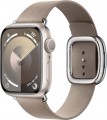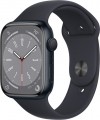Brightness
The maximum brightness in nits that the screen of the device produces.
The high-brightness displays remain legible under intense ambient light, which is important for quickly retrieving information from the dial outdoors on a clear sunny day. However, a large margin for this parameter affects the cost and power consumption of the display, which reduces the battery life of a wearable device.
CPU model
The model name of the processor (CPU) installed in the watch. Knowing this name, you can find detailed data on a particular CPU and evaluate its level and general capabilities. This is especially important due of the fact that these capabilities depend not only on the basic specs (number of cores, clock frequency), but also on specific design nuances.
RAM
The amount of random access memory (RAM) installed in the gadget.
This parameter is one of the key ones for the overall performance of the system: the more RAM, the faster the device works, the easier it is to handle tasks with high hardware requirements and the wider the set of applications that the gadget is able to run. Note that a large amount of RAM can compensate for even a relatively weak CPU. At the same time, you need to remember that different operating systems (see above) have different requirements for RAM and features of its use; therefore, only models on the same software platform can be compared by this indicator.
Memory storage
The amount of own storage provided in the design of the watch/bracelet. This memory is used for permanent storage of various information: call log, received SMS and other messages, additional applications, data on physical activity for a certain time, etc. The larger its volume, the more data can be stored in the device without the need to clean it to free up space. On the other hand, in the operation of smartwatches, large volumes (
64 GB,
32 GB,
16 GB, even
8 GB and
4 GB) are not always required, capacious drives are quite expensive, and replaceable cards installed in corresponding slot (see below).
Charging time
The time it takes to fully charge the battery of a wearable gadget is from 0 to 100%. In practice, this parameter depends on several factors: battery capacity (the larger it is, the longer the charging process will take), the power of the charger and charging technology (support for accelerated charging with increased power speeds up the process of restoring energy reserves in the battery cells). For most modern smart watches and fitness bracelets, full charging time varies from half an hour to a couple of hours. However, the specific time directly depends on the model of the gadget and the characteristics of the charger - it is advisable to clarify these points separately.
Strap Options
—
Skin. Leather straps are typical for a business style, they look rich and respectable, however, they are quite expensive. On the practical side, this material is strong, reliable and resistant to moisture; at the same time, it is quite demanding to care for, and if the appropriate rules are not followed, cracks may appear on the strap.
—
Rubber/silicone. Quite a popular material used not only for fitness trackers, but also for traditional watches. Rubber straps do not look as rich as leather ones, but they are also quite decent, while they are strong enough, durable, resistant to moisture and pleasantly felt on the hand. Silicone is similar in properties, which in appearance is practically indistinguishable from rubber. But the silicone is softer, does not pinch the hand and is more pleasant to the touch.
—
Metal. Metal straps (bracelets) are mainly made of stainless steel, but there are other options. Anyway, bracelets are highly durable and can be both light and massive, depending on the composition of the metal. It is also worth mentioning the high thermal conductivity of this material. Such a bracelet pleasantly cools the hand in the warm season, but causes the opposite effect in the cold.
—
Milanese bracelet. Metal bracelets made of links of very fine weaving (about 1 mm in size, or even less). The m
...aterial of such a bracelet may be different; most often it is steel, but more expensive metals are also found. Anyway, such a bracelet has an original appearance, and also provides good air access, allowing the skin to breathe. Among the shortcomings of Milanese bracelet, it can be noted that the links can “bite” the hair on the arm, creating discomfort.
— Textile. Usually, strong dense fabric (like nylon-based CORDURA) is used for straps, resistant to moisture, ultraviolet and other adverse factors. For some users, this material is more pleasant than other options; however, for a number of technical reasons, fabric straps were not widely used.
Many models of wearable gadgets are available with several strap options to choose from.Clasp options
The type of clasp used on a gadget's strap or bracelet.
The most common types of clasps today are the
classic buckle,
folding clip, folding lock,
magnet,
snap fastener, and
Hook-and-loop. If several options are indicated in the specs at once, it means that the gadget is supplied or can be supplied with different strap options using different types of fasteners. Here is a detailed description of each type:
– Classic (with buckle). Clasp resembling a belt buckle; originally used in traditional wristwatches, but nowadays it has become widespread in smart gadgets. On one half of such a fastener there is a U-shaped or similar frame with a special pin, on the second — a row of holes. When fastening, the second half is threaded through the frame, and the pin is fixed in one of the holes. At the same time, by choosing a particular hole, you can adjust the size of the strap. In addition, the advantages of the classics are reliability, neat appearance and compatibility with many strap materials (with the exception of metal bracelets).
— Clip (unfolding). An option for metal bracelets. The most widespread type of clip, consisting of two curved plates connected by an axis. When unfastened, they open like a book, increasing the overall length of the bracelet and allowing you to easily r
...emove the watch from your hand, and when fastened, they fold close to each other and are fixed, securing the bracelet on your wrist. Another, less popular variety is the “butterfly”, which has two flaps that, when opened, rise like wings. In general, the clips are very easy to use, but difficult to set up. They fasten and unfasten with literally one click, but it’s impossible to reconfigure the size of a bracelet with a clip “on the go” — you have to disconnect and reconnect special latches, which requires an additional tool and some skill.
— Magnetic. A fastener in which a strong permanent magnet plays the role of a latch. Such devices are simple and convenient both in use and in adjustment: for fastening and unfastening, it is enough to “stick” or “unstick” a magnet, and size adjustment is carried out right at the time of fastening — by tightening the strap to the desired length. The main disadvantage of such a clasp is that it can only be used with metal bracelets made of magnetic alloys — for example, steel.
— With lock. A clasp that resembles the buckle described above, but has a slightly different principle of operation. On one side of the strap with such a clasp there is a latch pin, on the other side there is a loop of a D-shaped or other shape, as well as a number of holes. When fastening, the side with the pin is threaded into the loop and then fixed in one of the holes; By choosing one or another hole, you can adjust the length of the strap. This design is especially suitable for rubber straps, it is simpler and at the same time more reliable than the buckle, which can also be used with such straps.
— Hook-and-loop. Classic hook-and-loop closure, used exclusively with fabric straps. Like magnetic clasps (see above), such clasps allow you to very accurately adjust the length of the strap right in the process of fastening. Among the disadvantages of Hook-and-loop, in addition to restrictions on the materials of the strap, it is worth noting the tendency to reduce reliability as it wears out. Therefore, nowadays, this type of fastener is quite rare, and is almost never used as the only one available — usually Hook-and-loop is supplemented with another option, for example, a latch.
— Folding lock. Clasp in the form of a detachable lock, the halves of which are on different halves of the bracelet. It is used with finely woven metal bracelets, the so-called "Milanese" ones; at the same time, one half is fixed motionless, and the second can move along its part of the bracelet — in this way the length is adjusted. A tool may be required for adjustment, but the procedure itself is simple — much easier than with clips. And the low prevalence of folding locks is mainly due to the fact that Milanese bracelets are rarely found in smart wearable gadgets.Wrist strap
Wrist coverage suitable for the included watch strap. Usually, the length of the strap can be adjusted, so this paragraph usually indicates not one number, but a range — for example, "130 – 200" (millimetres). If there are several straps in the kit, then several ranges are indicated in the specs, if necessary, with a clarification like “fabric: 115 – 185, metal: 130 – 220” (if the straps are made of different materials).
We emphasize that in this case we are talking not just about the length of the strap, but about the girth of the wrist, for which it is designed. Thus, by measuring your hand in an appropriate way, you can accurately determine whether a particular strap is suitable for a particular person or not. This possibility is especially important if the watch is bought for a user with a non-standard hand size — miniature or, conversely, very large.

